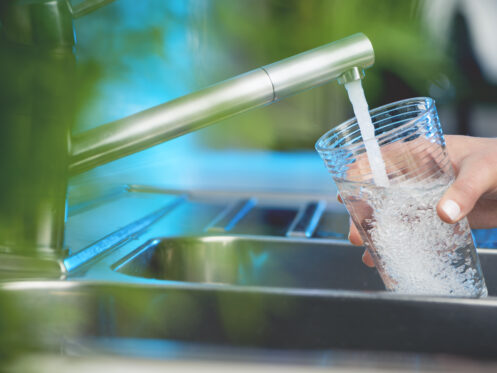Ever wondered why your water leaves spots on dishes or makes soap hard to rinse off? That frustrating experience often comes down to something called water hardness. Hard water carries high levels of minerals like calcium and magnesium, which can mess with everything from your plumbing to your laundry. At Best Plumber in Knoxville, TN, we know the struggle and can help you understand what’s going on with your water supply.
What Causes Water Hardness?
Understanding water hardness starts with looking at what’s floating around in your tap water. Most of the time, the issue comes down to minerals like calcium and magnesium. These minerals get picked up as water moves through soil and rocks before reaching your pipes. If your water comes from a well, you’re even more likely to deal with higher levels of hardness. It’s not harmful to drink, but it does cause some pretty annoying problems around the house.
When groundwater moves through limestone, chalk, or gypsum, it pulls in minerals that end up in your water supply. Calcium and magnesium are the usual minerals, but sometimes iron shows up, too. The longer the water flows through mineral-rich areas, the harder it becomes. Different areas have different levels of hardness, so you might notice more buildup in one place than another. Even if your neighbor’s water seems fine, your own supply could be much harder, depending on where it’s coming from.
Hard water can feel like a small issue until it starts interfering with your daily routines. You might notice soap doesn’t lather the way it should or your skin feels dry after a shower. Dishes come out of the dishwasher with spots or a cloudy film, and laundry feels stiff even after you wash it. All of these problems start with the same minerals you can’t see, but definitely feel.
Why Calcium and Magnesium Matter
You hear a lot about calcium and magnesium when people talk about hard water. That’s because they’re the two most common minerals behind the problem. When water dissolves these minerals, they stay in the supply as it travels to your faucets.
Calcium in your water often comes from limestone or gypsum. When the water passes through these materials, it picks up tiny particles. By the time it reaches your home, those particles are still there, ready to leave residue on your dishes and in your pipes. Magnesium usually comes from the same places and works the same way.
The tricky part is that the more of these minerals your water collects, the harder it becomes. That buildup affects how soap reacts with water, making it harder to rinse away. You might also find yourself scrubbing at shower doors or sinks more often than you’d like, only to see the spots return before long. The minerals don’t just affect what you can see, either. They also build up inside pipes and appliances, which can mess with efficiency and even shorten the lifespan of your appliances, like your water heater or dishwasher.
The Role of Iron in Hard Water
Calcium and magnesium get most of the attention, but iron can make things worse. If your water looks rusty or leaves orange stains on your fixtures, iron’s probably involved. Unlike calcium and magnesium, iron gives your water a noticeable color change when there’s enough of it. The metallic taste can also affect your cooking or drinking water, which adds another layer of frustration.
Iron shows up in water for similar reasons as calcium and magnesium. It gets pulled into the supply as water flows through certain soils or rocks. Sometimes, it’s also a sign that your plumbing system has corroded, especially if you notice the discoloration after the water’s been sitting in the pipes for a while.
While iron doesn’t always cause the same issues with soap or scale buildup, it does stain pretty much anything it touches. Laundry, dishes, sinks, and toilets all end up with that rusty tint. And if your water heater has iron deposits, it can make the water temperature inconsistent or even damage the appliance itself.
Testing for Hard Water
Checking if you have hard water is pretty simple. You can buy test kits that measure how hard your water is. They’re easy to use and show results in grains per gallon or milligrams per liter. The higher the number, the harder your water is. Most experts consider anything above 7 grains per gallon to be hard.
If you want a more precise reading, you can have your water tested professionally. That’s especially helpful if you also deal with issues like high iron content or strange odors.
Upgrade Your Water System Today
Learning about what makes your water hard gives you a clearer idea of how to tackle the problem. Whether you’re curious or trying to find a fix, we’re here to help. Call Best Plumber today and let us help you find the best plumbing solution for your home, whether you need water filtration or a water softener. We also offer water heater, drain, sewer, rooter, gas line, and emergency services.




